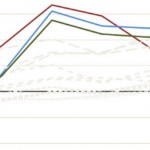Perspective and Different Conclusions from the Same Data
By way of a quick follow up to my post on the state’s taxpayer-migration study, Ted Nesi’s related post, mostly quoting Revenue Analysis director Paul Dion, offers an excellent opportunity for some meta-analysis of how perspective affects one’s policy conclusions from a given set of data.
Dion plays it very close to the vest. More than once, he states, “That is significant.” But he doesn’t take the next step of telling readers why he believes that. Why is it significant that older, wealthier Rhode Islanders who were “movers” — that is, who continued to file tax returns in Rhode Island after changing their residences — were so much more likely to head to Florida?
Perhaps he’s thinking of the common wisdom (which I heard RI Foundation’s Neil Steinberg voicing the other day) that people migrate to Florida for the weather. However much that’s true for some people, it remains an important question: If the tax comparison were different, would they change their habits to remain in Rhode Island half a year plus a day, rather than the other way around?
Something similar arises with this:
As for Goners [those who left and never filed another RI return], the largest percentage was in the $200,000-to-$500,000 AGI category and was skewed younger than the Movers. This indicates to me that this group is likely comprised of executive-level professionals who relocate because of a new job.
Maybe Dion’s instincts are correct, and it’s easy to imagine status quo apologists concluding: “See, it’s not our tax climate; they’re moving for jobs!” But that’s not a relief; it’s a problem. Why aren’t those jobs here.
Dion also notes that Massachusetts becomes a more prominent destination for those who leave when one focuses on younger wealthy Rhode Islanders. That could indicate both that they’re taking jobs out of state because they want to stay within reach, but can’t find jobs in RI, and that they’re making their moves as a means of avoiding Rhode Island’s burdensome environment of taxes, regulations, and other mandates.
In any of these cases, how one approaches the data affects whether one concludes that Rhode Island can continue to impose its present burden on people in a mobile society.
(Note: a version of this post was up for about five minutes that incorrectly attributed Dion’s commentary to Ted.)



